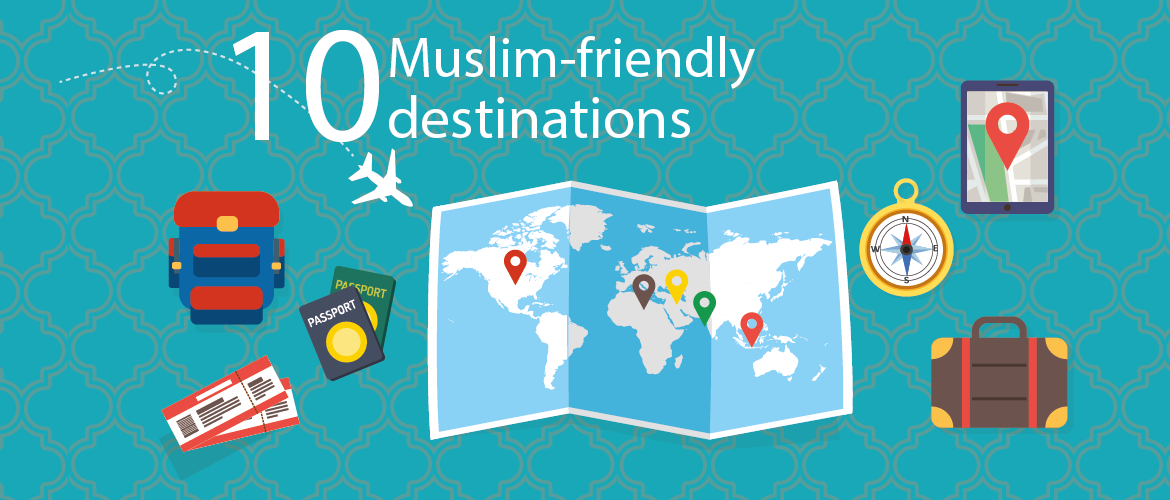Ten Muslim-friendly destinations
The number of Muslim tourists and travellers has been increasing steadily every year, and their travel-related expenditure is estimated to grow from USD145 billion in 2014 to USD200 billion by 2020.
Many countries have made changes to their tourism industries to cater to this expanding market and this is good news for the Muslim traveller who can now choose from an ever growing list of destinations. Here are some countries that are known to cater to this segment.
Indonesia
As one of the largest Muslim-majority countries in the world, Indonesia is teeming with attractions and activities such as the lush beaches of Bali, dive sites in Komodo and Lombok islands, ancient monuments in Borobudur for history lovers and city lights and luxurious shopping malls in Jakarta. The country is also actively promoting halal tourism by designating at least 10 regions and provinces as halal tourist destinations.
Some of the provinces chosen include Jakarta, West Sumatra, Aceh, Central Java and West Java and a few others. In the country’s drive for Islamic tourism, Lombok, known as an “island of 1000 mosques”, has aptly taken centre stage. Fast becoming a favourite of tourists from the Middle East, there are plans to build an Islamic centre that will have a mosque, hotel and a study centre. Guides are being trained to have useful visitor information, such as the nearest mosque, at their fingertips. Alcohol-free hotels and Muslim-friendly zones are also being encouraged on the island.
Malaysia
A quick search of top Muslim-friendly places to visit on any search engine usually lists Malaysia. The country is known for its friendly locals, mouth-watering food choices, diverse wildlife and breathtaking beaches and dive sites. It is also home to the former tallest buildings in the world, the Petronas Twin Towers, located in the capital city of Kuala Lumpur.
Turkey
A meeting point of Western and Eastern cultures, Turkey has an abundance of historical monuments and stunning architecture from its Byzantine and Ottoman Empire past. It is also famous for the Hagia Sophiabasilica-turned-mosque which was finally turned into a museum in 1935.
Spain
Spain has long been a tourist magnet but recently, halal tourism has been given a boost in this country and it’s no surprise as historically Spain has had much Muslim influence. For more than 700 years, the Moors ruled in Granada and left a legacy of Islamic-influenced architecture and culture. There are special tours too that focus on Islamic heritage, bringing tourists to other regions like Andalucia and ensuring that meals are arranged at halal or seafood restaurants.
Morocco
Discover the best combination of European and African/Arab heritage in Morocco. The Kingdom is known for its diversity in geography, architecture, Islamic-influenced music and dance. A major centre of the Islamic Civilisation, it has produced poets, philosophers and thinkers for many generations. Of course, don’t forget to indulge in the culinary delight of the tagine—where all the varied flavours of Morocco come together in one deeply satisfying dish.
Bosnia and Herzegovina
The country was long known for a rather grim past: its capital city of Sarajevo, for example, was where the Archduke Franz Ferdinand of Austria and his wife were assassinated, triggering the events of the First World War. Today the city boasts numerous beautiful mosques and is surrounded by lush, green countryside.
Jordan
Home to more than 100,000 archaeological tourist sites, Jordan is rich in religious landmarks and ancient architecture. Swim—or rather float—in the Dead Sea and visit one of the New Seven Wonders of the World, Petra or Rose City, the most visited tourist attraction in the country.
Malta
The country’s history is a blend of several cultures, all of which have left their unique marks. Featuring baroque architecture and ancient venues, Malta’s capital city of Valetta is a UNESCO World Heritage Site.
Oman
A place of untouched beauty, Oman is home to honey-coloured dunes and blue waters and is ideal for nature lovers. Other attractions include the country’s renowned desert safari and opportunities to either watch turtles lay their eggs on the beaches of Ras al Hadd or wild bottlenose dolphins frolic off the coast of Fahal Island.
Singapore
Singapore is gaining traction in the global Muslim tourism industry despite not being a Muslim nation. Thanks to its increasing numbers of halal eateries and prayer rooms, the home of the Merlion is slowly becoming a popular destination, complementing its attractions with contemporary architecture across the Marina Bay, high-end shopping malls stretched across Orchard Road and world-class services.
Facts on the Islamic travel industry
The Muslim population is expected to make up 26 per cent of the world’s population by 2030.
Today there are 117 million Muslim travellers. This is estimated to rise to 168 million by 2020 (Crescent Rating).
In 2013 Muslim travellers generated USD140 billion for global tourism and hospitality.
The industry is worth USD142 billion in 2014, 11 per cent of global expenditure.
This is expected to rise to USD233 billion by 2020.
More than 25 per cent of the greatest growth in international tourism among the top 20 countries are from an Organisation of Islamic Cooperation (OIC) country.
Malaysia is ranked no.1 for most popular destination on the OIC list of destinations.
The growth in the industry spurred the setting up of the World Halal Tourism Summit, which began in 2015.
___________________





